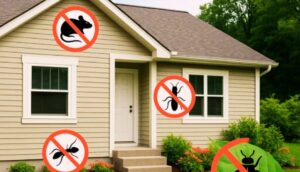How to Stop Fall Pests from Overwintering

Garden insect pests are most active during spring and summer, but now that we are in the fall months these bad bugs can still wreak havoc though the growing seasoning is slowing down as winter approaches. Garden insect pests are still very active preparing to overwinter or to hide from the harsh winter frost and emerge once spring arrives. But what can we do in our gardens to ensure that these insects are dealt with and not become an issue once the growing season returns? Some steps can be taken to protect our garden plants while eliminating garden pests.
1. Tidy Up Your Garden
A garden that is well kept is not only beautiful but will encourage healthy plant growth, when a garden is cluttered and not properly maintained will encourage rodents and increase chances of disease and the presence of garden pests. Insect pests will seek to overwinter in leaf litter and other plant debris therefore it’s important to rake up and remove all fallen leaves from garden plant beds. The leaves can be placed in your compost or even starting a compost pile. Leaf removal will not only reduce insect pests hiding places where they seek to take shelter but if any eggs were laid will also be removed with debris cleanup. If leaves and other plant material are diseased or insect infested properly dispose of them, and don’t add them to your compost bin.
Weeds are another issue because weeds not only take away from a garden’s beauty but will compete with garden plants for water, nutrients, and sunlight, weeds are also known to be carriers of disease. Garden pests will use weeds as a harborage to lay their eggs and to protect eggs from predators and the elements. Ensure that tall weeds are removed from in and around your garden.
All growth that is no longer producing or died back should be removed, diseased plant material can be pruned and placed in a sealed garbage bag and properly disposed of.
Leaves should be raked and removed from your lawn because leaves that are allowed to remain become matter because of extra moisture which can lead to disease. Once this happens your turf will become weak and stressed which will lead to more issues that can severely cause damage or setback and in some cases, your lawn might never recover.
2. Remove Food Sources
The removal of food sources from your garden will discourage the presence of insect species ( stink bugs, boxelder bugs) and rodents. Make sure and pick up any fallen fruits and properly dispose of them.
3. Tilling Your Garden Soil
Tilling your soil during the fall months and then again in late winter for the preparation of spring will interfere with or disrupt the life cycle of insects that pupate or overwinter in garden soil as adults. Some of these insects include grubs, squash bugs, cabbage moths, cabbage worms, cabbage loppers, cutworms, vine weevils, Colorado potato beetles, etc… Tilling the soil will also bring insects that inhabit the soil to the surface exposing them to predators and the winter chill causing elimination.
4. Clean Your Gutter
A gutter filled with leaves will not only restrict the proper flow of rainwater but will lead to moisture build-up that will encourage disease. Garden pests will also see this as a harborage to overwinter so ensure your gutters are always cleaned.
5. Crop Rotation
While you may not be thinking of planting crops during this time of the year it is good to rotate crops the following growing season especially if there are issues with garden pests.
6. Create a Barrier
Creating a barrier around the premier of your yard not just your garden is a great way to deter garden pests for example rats, voles, and mice, this barrier protection will not only discourage pests from your yard and garden but from seeking an entry point into your home during winter time.
7. Give Your Compost Pile Some Attention
Garden pests will go as far as seeking shelter in your compost bin, if you want that added protection to ensure that your compost pile remains free of insect pests then here is what to do. Either spread your compost over the soil and garden borders or add hydrated lime that will cause bugs not to stick around a third option is to add some sawdust or dry soil to your compost. Keeping a good brown-green ratio or frequently turning your compost can also help to deter garden pests.
Additional information
To discourage the spread of disease when conducting pruning operations make sure that your hand pruner, lopper, pruning saw, and other pruning tools are sterilized before and after pruning procedures. A solution of water and bleach to clean the tool’s blades is sufficient.
10 Frequently Asked Questions (FAQs)
1. What are the most common household pests?
Common household pests include ants, cockroaches, spiders, rodents (like mice and rats), termites, bed bugs, fleas, mosquitoes, and flies. Each has different habits and hiding spots, so it’s important to know what you’re dealing with to choose the right control method.
2. What’s the first step in effective pest control?
The first step is identifying the pest. Knowing whether you’re dealing with ants or termites, for example, makes a big difference in how you treat the problem. Once you identify the pest, you will be in a better position to select the best prevention and treatment plan.
3. Are natural remedies effective for pest control?
Yes, natural remedies like vinegar, essential oils (such as peppermint and tea tree), diatomaceous earth, and baking soda can be effective for mild infestations. However, for severe problems, you may need stronger or professional treatments.
4. How can I discourage pests from entering my house?
Seal all cracks and crevices, repair screens, keep food sealed, take out trash regularly, and maintain a clean, clutter-free environment. Also, keep outdoor areas tidy, and don’t let standing water accumulate—it attracts mosquitoes and other bugs.
5. Is it better to use DIY pest control or hire a professional?
It depends. For small issues like a few ants or a spider here and there, DIY methods work well. But for infestations (like termites or bed bugs), it’s best to call a licensed pest control expert to prevent long-term damage or health risks.
6. Are pest control products safe for kids and pets?
Many pest control products today are labeled pet- and child-safe, but you should always follow label instructions carefully. Consider using bait stations or natural alternatives if you’re concerned, and always keep products out of reach.
7. How often should I apply pest control treatments?
It varies depending on the pest and product. Some treatments work for 30–90 days, while others need monthly applications. Preventive pest control is often done quarterly by professionals to maintain a pest-free environment year-round.
8. Will weather affect pest activity in the home?
Absolutely! Rain, heat, and cold can encourage pest to seek shelter indoors. For example, ants often seek shelter during heavy rain, and rodents may move in during colder months. Pest-proofing your home before seasonal changes can reduce the risk of invasion.
9. Why do pests keep coming back even after treatment?
Pests often return if the source of the problem isn’t fully addressed—like leaks, crumbs, or outdoor access points. Some species, like cockroaches and bed bugs, are hardy and reproduce quickly, so follow-up treatments may be necessary.
10. What’s the best long-term strategy to control pests?
Combine prevention, monitoring, and safe treatment. Keep your home clean, seal entry points, inspect regularly for signs of pests, and use treatments as needed. A consistent approach is key to keeping pests under control long-term.
Conclusion
The fall months are final here but our work is not done, there is still the task of maintaining our gardens from insect pests, they have not gone on break but are very active preparing for the winter months. Putting these steps in place will ensure that you have a garden free of insect pests and rodents so when spring returns your garden plants will get off to a great start as we once again welcome the warm season where we can again begin to grow our favorite crops or those prized flowering plants that make our gardens and landscapes look so amazing.










Wow, this article is packed with really useful tips! I love how it not only focuses on pest control but also on the overall health of the garden as we head into the colder months. Tidying up the garden, tilling the soil, and managing compost are such smart ideas to keep pests from overwintering. I’ve personally seen the benefits of cleaning up fallen leaves and debris. It really makes a difference in keeping the garden healthy! The advice on rotating crops and creating barriers is something I haven’t tried yet, but I’m definitely going to give it a go this season. Thanks for the detailed breakdown, perfect timing as we head into fall!
Thank you so much for your kind words, I am so happy to help. These methods will help to discourage garden insect pests from overwintering.